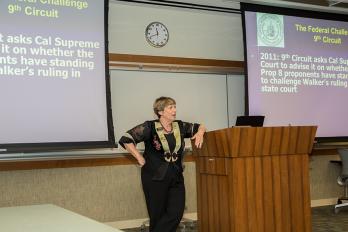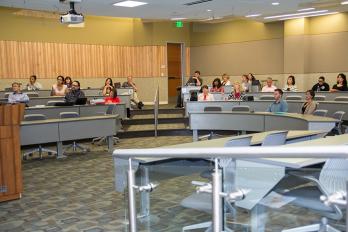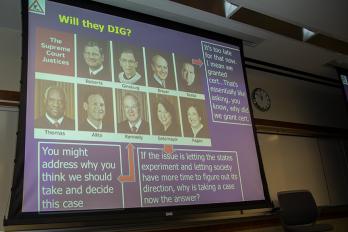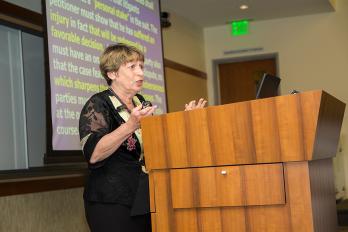Professor Greenberg Talks About Supreme Court Same-Sex Marriage Cases
June 18, 2013
What is the future of same-sex marriage?
That was the title of Professor Julie Greenberg’s lunchtime discussion on June 17 at TJSL.
And it’s a future that is very hard to predict.
The issue may…or may not…be settled when the U.S. Supreme Court issues its decision on California’s Proposition 8 and the Defense of Marriage Act (DOMA) sometime in June.
Professor Greenberg went over a series of possible outcomes of the Supreme Court’s decision and the effect it will have. And as she said herself: “This is all very complex.”
The high court decided to hear the California Prop 8 case after the U.S. Court of Appeals for the 9th Circuit ruled that Prop 8 was unconstitutional since the Supreme Court of California upheld the right of same-sex couples in California to marry.
According to Professor Greenberg, one course of action the court can take on Prop 8 is to “DIG” – meaning that the high court would not decide the merits of the case, but announce that cert (certiorari) was improperly granted and the court should not have taken the case. That would mean California same-sex couples could marry based on the 9th Circuit opinion.
Another course of action would be to decide that the proponents of Prop 8 who brought the case to the Supreme Court had no standing. Then California same-sex couples would probably be allowed to marry – but that scenario is subject to debate, according to Professor Greenberg.
The Supreme Court could strike down Prop 8 on either of three different sets of grounds – and lead to three different outcomes when it comes to same-sex marriage, Professor Greenberg explained.
If Prop 8 is ruled unconstitutional, then all states must allow same-sex couples to marry. If the court rules that it violates the Equal Protection Clause, then states can provide full benefits to same-sex couples in civil unions, but not legalize marriage. And if the high court agrees that the 9th Circuit was right in ruling that the state cannot withdraw the right for same-sex couples to marry once it has been granted – then in California the couples can once again get married.
And if the high court rules that Prop 8 is constitutional, then all states are free to grant or deny marriage to same-sex couples.
Professor Greenberg went through another set of possible outcomes for DOMA. IF the court finds DOMA is constitutional, then same-sex couples do not receive federal benefits. If DOMA is ruled unconstitutional, then same-sex couples in states that recognize same-sex marriage can receive the same federal rights and benefits as opposite-sex couples.
So, what does Professor Greenberg think the Supreme Court will do?
“These cases involve a number of complex legal issues,” she said. “In addition, it is always difficult to predict how a particular justice will rule based on comments and questions during oral argument. I think that there is a significant likelihood that the Prop 8 case will be decided on procedural grounds. A likely outcome is that the Court will find that the Prop 8 proponents lacked standing to bring this lawsuit. The Court could also DIG, or dismiss the case, although this outcome is probably less likely than a finding of no standing. I think it is more likely that the Court will issue a decision on the merits of the DOMA case and if it does, it is likely to rule Section 3 of DOMA is unconstitutional. Constitutional law scholars who have closely studied the Court in general and these cases in particular disagree with each other on the likely outcome in both cases.”



